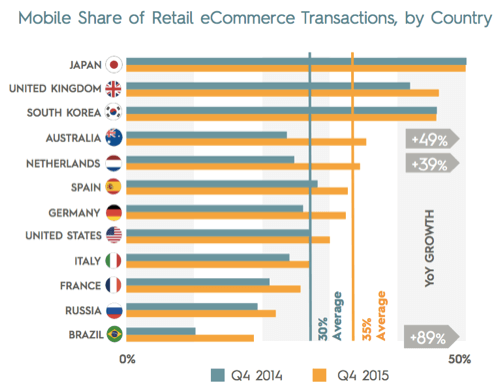Mobile has promised to be the great social leveler, with 90% of the world’s population over the age of 6 projected to own a phone by 2020. But according to a new Caribou Wireless study, virtually all of the value in the app economy is captured by the rich.
Rich consumers. Rich developers.
Unfortunately, it’s only going to get worse. Developing economies sometimes scrape themselves out of a trade deficit by manufacturing for more established economies (e.g., Taiwan building semiconductors for the West). But in the app economy, “69% of developers [in lower-income countries] were not able to export” their apps to higher-income markets, as a report from Caribou Wireless finds.
The Rich Get Richer
Apps have never been a great way to make money. According to VisionMobile’s survey of 8,000+ developers, revenue from app store sales grew 70% year over year in 2015. Even so, “60%+ of developers are under the app poverty line,” the report concludes, meaning the developers make less than $500 per month on iOS apps and even less from Android.
Dig into those numbers, however, and it’s clear (though perhaps not surprising) that things are much worse in lower-income economies, as Caribou Wireless finds:
- 81% of developers [are] in high-income countries, which are also the most lucrative markets;
- 95% of the estimated value in the app economy is captured by just 10 countries;
- ~33% of developers only serve their domestic market, “but this inability to export to other markets was much more pronounced for developers in lower-income countries, where 69% of developers were not able to export, compared to high-income countries, where only 29% of developers were not able to export. For comparison, only 3% of U.S. developers did not export.”
Part of the problem for a developer in a lower-income market is that she is sometimes blocked by Google and Apple, which control the dominant app stores, from selling her apps through those stores.
But even where developers face no such prohibitions, their micro-markets are too small to sustain them, while they get lost in the larger markets, assuming they’re not geo-blocked. The app store model results in a winner-takes-all bonanza for the fortunate few developers who can stand out. Everyone else…languishes.
Buying A Future
Fortunately, there’s mobile commerce. Caribou Wireless’ report focuses on income derived from selling apps, but a far larger opportunity awaits those that sell physical goods through mobile websites and apps. Though the U.S. dominates the app economy, it has been comparatively slow to embrace mobile commerce, leaving a more open playing field, as a new Criteo report uncovers:

This increasing acceleration of mobile commerce has been evident for some time, and it promises to do more for the app developer underclass than apps ever have. How much more? Consider that in 2015 mobile commerce was 2.5x bigger than all of the app economy, according to VisionMobile.
That’s a lot more “pie” for aspiring developers, if only they would. According to that same VisionMobile developer survey, just 9% of app developers are focused on mobile commerce. This needs to change if app developers hope to get above the app poverty line.
In short, rather than trying to export mobile apps to established economies, aspiring app developers should turn their attention to selling physical goods through mobile apps and websites within their home markets. In such markets mobile phones are already the preferred consumption device, giving them a solid base of consumers.





